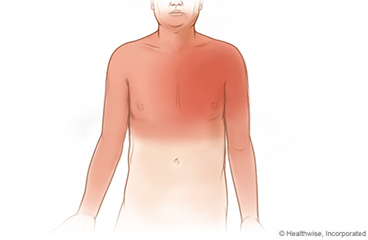Angina: Care Instructions
Overview

Angina happens when there is not enough blood flow to your heart muscle. This low blood flow is often a
result of coronary artery disease. Coronary artery disease happens when fatty deposits called plaque (say
"plak") build up inside your coronary arteries. This plaque may limit the amount of blood to your heart
muscle. Having coronary artery disease also increases your risk of a heart attack.
Chest pain or pressure is the most common symptom of angina. But some people have other symptoms, like:
-
Pain, pressure, or a strange feeling in the back, neck, jaw, or upper belly, or in one or both shoulders
or arms.
-
Shortness of breath.
-
Nausea or vomiting.
-
Lightheadedness or sudden weakness.
-
Fast or irregular heartbeat.
Angina can be dangerous. That's why it is important to pay attention to your symptoms. Know what is typical
for you, learn how to control your symptoms, and understand when you need to get treatment.
A change in your usual pattern of symptoms is an emergency. It may mean that you are having a heart attack.
If you notice any problems or new symptoms, get medical treatment right away.
Follow-up care is a key part of your treatment and safety. Be sure to make and go to all
appointments, and call your doctor if you are having problems. It's also a good idea to know your test results
and keep a list of the medicines you take.
How can you care for yourself at home?

Medicines
|
|
-
If your doctor has given you nitroglycerin for angina symptoms, keep it with you at all times. If
you have symptoms, sit down and rest, and take the first dose of nitroglycerin as directed. If your
symptoms get worse or are not getting better within 5 minutes, call 911 right away. Stay on
the phone. The emergency operator will give you further instructions.
|
|
|
|
|
|
|
Heart-healthy lifestyle
|
|
|
|
|
-
Eat heart-healthy foods. These include vegetables, fruits, nuts, beans, lean meat, fish, and whole
grains. Limit sodium, sugar, and alcohol.
|
|
|
|
|
|
|
|
|
-
Manage other health problems such as high blood pressure, high cholesterol, and diabetes. If you
think you may have a problem with alcohol or drug use, talk to your doctor.
|
|
|
-
Avoid infections such as COVID-19, colds, and the flu. Get the flu vaccine every year. Get a
pneumococcal vaccine. If you have had one before, ask your doctor whether you need another dose.
Stay up to date on your COVID-19 vaccines.
|
|
|
|

Activity
When should you call for help?
 Call 911
anytime you think you may need emergency care. For example, call if:
Call 911
anytime you think you may need emergency care. For example, call if:
Call your doctor now if:
|
|
-
Your angina symptoms seem worse but still follow your typical pattern. You can predict when
symptoms will happen, but they may come on sooner, feel worse, or last longer.
|
Watch closely for changes in your health, and be sure to contact your doctor if you have
any problems.
Current as of: June 24, 2023
Content Version: 14.0
Care instructions adapted under license by your
healthcare professional. If you have questions about a medical condition or this instruction, always ask
your healthcare professional. Healthwise, Incorporated disclaims any warranty or liability for your use of
this information.